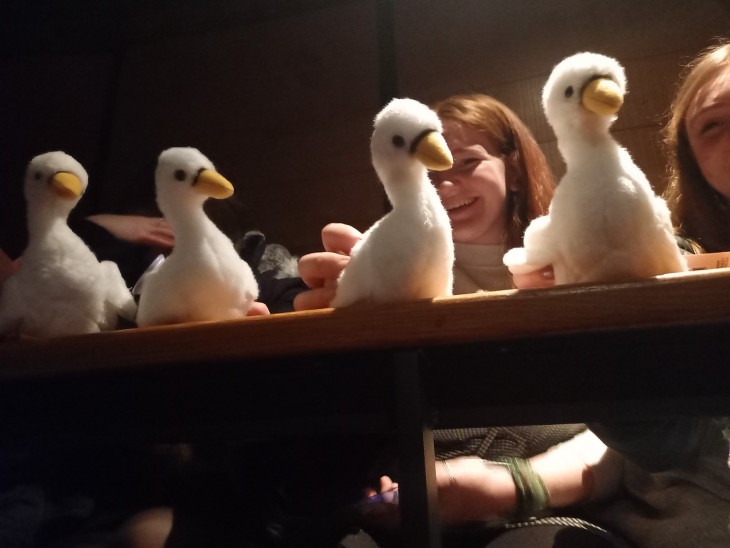20th March 2023
Our English Literature students took a trip to the Stratford-upon-Avon Theatre earlier this month to watch Shakespeare’s play – The Tempest. Our students and staff all marvelled at the high energy performances along with the fascinating comments that highlighted our current climate crisis and colonialism which were incorporated incredibly well into the production. Before the play began the students had time for a spot of shopping and found some new class mascots – swans!

Poppy, was one of the students on the trip, she studies English Literature alongside A-levels in Textile Design and Drama Theatre Studies. Poppy is hoping to go into the Theatre and Performing world after she has completes her A-Levels at St Brendan’s and has incorporated her love for theatre across 2 of her 3 A-levels.
Poppy wrote us a review on The Tempest which you can read below:
The Tempest at the RSC 2023- A Review
This production of The Tempest was based around the idea of environmental pollution, full of plastic bottles, oil tankers and nets used throughout the play in costume, set, and props which also aid the retelling of the past (such as Prospero's tale of how he got to the island and Antonios usurpation of the king). This intriguing idea ties in well with the theme of paradise and a place supposedly untouched by mankind, yet is still infected and slowly cleaned by Ferdinand and others throughout the play to leave the stage clean of pollution. Set on a thrust stage, Prospero commands the storm, mariners and courtiers through his staff as they rock around her: although this was effective at showing the tempest with no additional need for set, it was quite underwhelming and didn’t portray the exposure and threat the storm posed as they all gently rocked with not much alarm. In this production, Caliban and Ariel are portrayed in a very human light, with minimal makeup and wearing similar clothes as Miranda and Prospero, depicting them as more emotional and sympathetic than perhaps the majority of other adaptations. In particular, Caliban begins to wear the necklace of Sycorax as he strays away from the rule of Prospero, an interesting detail further portraying his link to his mother whom may have also been betrayed and overthrown by Prospero's arrival on the island. Puppetry was used frequently throughout this production, in the description of Alonzo's death to Ferdinand, the harpy and the wolves through recycled rubbish; This created a sense of childish wonder and imagination in the play, insinuating further Prospero's point of ‘we are such stuff as dreams are made on’ and a clever way of representing these moments uniquely.
The choice of Prospero being a woman was a very good one for this production, as the bond between mother and daughter was much more caring and genuine than perhaps a father and daughter are, as Prospero appears more genuine and happy to see Miranda fall in love with Ferdinand. This leaves Prospero by the end of this production less lonely and more fulfilled/moved by what has happened in the course of the days Tempest, contrasted to Prospero's epilogue which was realized with more suffering and demanding than I imagined when reading.
Further, a standout scene was the harpy scene, not only as the harpy was a 5 person puppet whose wings made of rags and plastic spanned the whole stage, but also the eeriness of the figures who serve the banquet and a giant distorted funhouse-like mirror at the back of the stage which reflected the actors in weird, enlarged shapes as if in a nightmare. As the harpy approached, Antonio, Sebastian and Alonzo begin to choke on the banquet of black liquid and snakes which was a surprise, showing the power and evil both the harpy and Prospero's power holds, justifying their turn further into madness and casting a darker shadow over Prospero. Another amazing moment was during the masque, wherein the back of the stage (draped in a large piece of fabric) opens to reveal a golden forest and doubles the size of the stage: its effect was incredible, contrasting to the dirty stage previously acted upon. The way this production also ended was very satisfying, wherein Prospero creates a compass-like arrangement of sticks and her staff and calls upon the mariners and courtiers who begin to walk in a circle around this. Although simple, I really liked this physical depiction of how peace is restored to the island and between the people. This adaptation of freeing Caliban and Ariel was also amazing, wherein Caliban climbs away across the set whilst speaking in a different language, supposedly his native language which he used before being taught English by Prospero and Ariel spinning/flying upwards and exiting in the flies, their shadow casted on a downlight upon Prospero, alone and being rained upon from above as she says her epilogue.